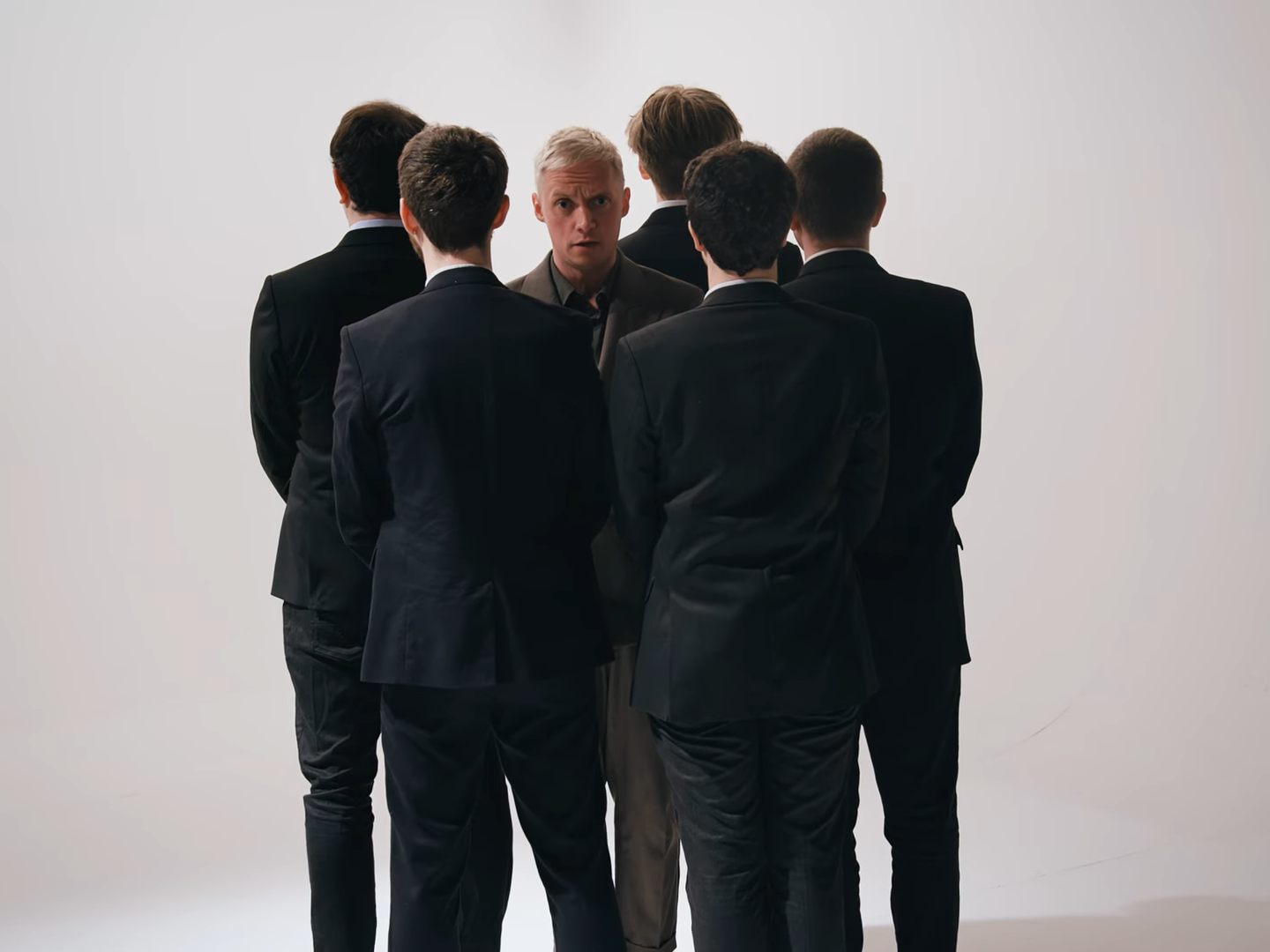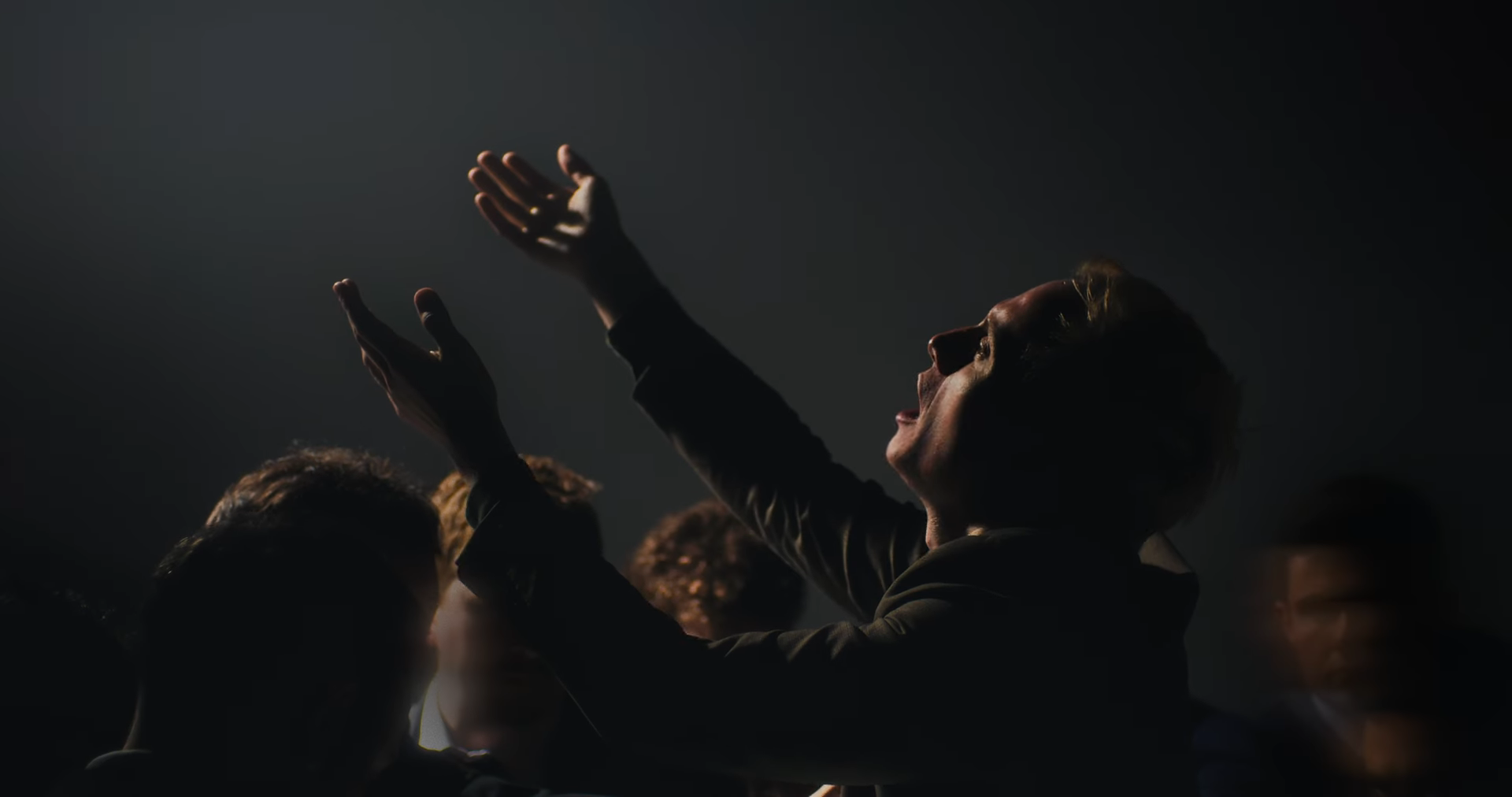It may seem a bit unprofessional to be proclaiming my “album of the year” when there are a little under two months left in the year, and a healthy heaping of albums both acclaimed and obscure I have not found the time to hear yet from this year, but frankly at this point I cannot fathom in the remaining days of 2024 finding another album that will have resonated as deeply with me, and certainly not one that I will devote as much time to as A Firmer Hand by Edinburgh-based singer/songwriter Hamish Hawk. Although Hamish has been releasing music since at least 2014, I was first introduced to his work through this newest effort, which seems quite opportune since Hawk himself has viewed the album as a major artistic shift in his body of work.
Having gone backwards through his discography throughout this year, it is quite easy to see the ways he has evolved both as a songwriter and a lyricist, even signifying this metamorphosis through the way his self-image is reflected in the album art of his last three albums. With his 2021 album Heavy Elevator, Hawk is shown clearly and honestly staring dead ahead at the viewer, a humble and candid image of a man laying himself bare, while on his 2023 follow up Angel Numbers he is suddenly shown in a much more abstracted light, impressionistic colors and splotches of texture wrapping around his body and completely dissolving his face into something indescribable. This evolution of the self seems to have come full circle with the stunning cover for A Firmer Hand, photographed by Michaela and Richard Simpson. Here we see Hawk bathed in shadow, his skin stark white against the pitch-black background, and his face still half-submerged, one defiant eye peering out as if he is still in the process of emerging in this new form. This album cover not only showcases his work’s shift in tone, but also seems to communicate the imagery of yin and yang, an acknowledgement of the darkness within light, light within darkness, femininity within the masculine, and vice versa.

In an interview with Loverboy Magazine, Hawk himself acknowledged this shift, conceding that A Firmer Hand is a much darker record than his previous oeuvre. When asked about the conception of the record, he stated that while writing the record “[he] opened [his] closet, and a skeleton came out.” With this statement, he reveals the central focus of the album, a dissection of male sexuality and a clearing out of all the hidden and awkward aspects of his own relationship with the powers of romance and carnal desire. A Firmer Hand is an album replete with allusions to men who take on many forms: lovers, trysts, friends, strangers, artistic inspirations, and even further within these roles, Hawk explores the myriad ways in which they have affected his life.
As an example, in the song Machiavelli’s Room, Hawk boasts of his sexual prowess with one lover, describing acts of pinning him to a wall, making him “shriek like a siren”, and even rather boldly describing feeling him “fit [him] like a glove” (complete with a tongue-in-cheek “no kidding…”) as he penetrates his body, sinking and disappearing inside of him. While on a surface level these suggest a much more confident and controlling side of his sexuality, the other half of the lyrics reveal something of an insecurity and a desire to assert himself, a dominance only allowed to manifest through the seductive tactics of his lover. Throughout the first two verses, Hawk makes romantic claims of his lover, showcasing the power this man seems to have over him. With the first verse he states “All my battle scars are healed by his charms / All my dead guitars sing where he strums”, a sentiment both deeply emotional and sexually-charged, with a beautiful double entendre revealing itself in the latter line as he draws a direct parallel between his artistic inspirations and his physical urges being fulfilled through acts of intimacy, the “dead guitar” a rather clever allusion both to artistic block and performance anxiety. I’ll leave it to your imagination what this means for “where he strums.” These confessions of anxiety, navigating his own wants and needs are further exemplified in the second verse, where he confesses “I fear I was close to love” before doubling down on the enchantment his lover possesses with the line “I showed him hidden things / He coaxed them from hiding.” This acknowledgement of the paradoxical roles they take on of a shy, yet physical top and a submissive, yet transfixing bottom comes to a head in the chorus where Hawk croons “Sure it’s sick on the surface / We’re both unfit for our purposes.” Even within these memories of unfiltered sexual contact, Hawk still seems to lament something within himself, unable to take his blessings for what they are, always seeking out the underlying misery and danger that tinges all intimacy, a sentiment emphasized exquisitely in one of the final songs of the record Milk an Ending where he boldly states "The underside of all love / Is rust, as we've discussed", a statement which seems to not only be directed at the focal lover of the song, but also at us, the listeners who find him time and time again revisiting these dark underbellies of moments of bliss and joy.

In one of the lead singles for the album, Men Like Wire, Hawk further explores these cyclical themes of his own struggles with accepting his sexuality by dissecting memories of ways he has felt his own view of his masculinity shrink and transform into something more malleable and tender amongst other men, remarking: I watched my body soften / In front of men built like wire / Thrilling as sick leave / Vainglorious men / Fulfilling as a dry heave / I’ve seen their question marks / Let’s hear their full stops / For all of my life they’ve played me for jokes.” Within this chorus, we see a true prism of emotion refracting in multiple directions, a confession of both desire and fear within the presence of other men, and the conflicting emotions that rise from any attempt to connect with them. Hawk expertly dishes out indictments of this insecurity in others, seeming to allude to homophobia both in traditional heteronormative culture as well as the ways it internalizes itself within queer men, too filled with shame and the weight of cultural expectations to fully embrace themselves with confidence. In the final leg of the song, Hawk even allows himself to look inward, interrogating his own shame’s roots, remarking “My shame flashed back in Protestant glass / Heard skips in the track in All Things Must Pass / I paid my respects to the snakes in the grass / And I never tire / Will I never tire of fronting?” Within this beautiful bridge, we see that the all too familiar culprit of religious guilt rears its ugly head, an arresting force that to this day has effectively caused a ‘skip’ in the record of his life, unable to fully live up to his own ideal self, always stuck in the same lines and thoughts.
As a queer person who has long struggled with my own sexual and romantic proclivities, particularly to men, I find so much validation and companionship in Hawk’s confessional lyrics, and I find myself too asking these questions of when I will finally tire of fronting, of shielding myself from the hurt that comes with allowing oneself to be perceived wholly and without compromise. Regardless of one’s sex, gender, and orientation it is a terrifying thing to allow yourself to be you, particularly in a world so dead set on reinforcing strict rules and orders that seek to define you without allowing you any say. Perhaps though the cruelest and most ironic form of this insincerity in oneself is when your identity is fully apparent to everyone around you, and yet you find yourself stuck firmly within a glass closet of your own making. Eventually you must acknowledge you are in a prison of your own making, and that just as others can peer in and see what you are, you too can peer out and see that they know. When faced with this reality, to double down and deny your own reality does nothing more than spiritually stifle your own light and beauty and makes you just as duplicitous and complacent in your own erasure as any exterior forces that may seek to expunge you.

With this acknowledgement, I’d like to transition into talking about my single favorite song of the album, the opener Juliet as Epithet, a mournful song about the awkward tiny moments of relationships, and the small things that feel inconsequential in the moment and yet leave large shadows over our thoughts, tiny details that speak volumes about how we conduct ourselves around those we love, and how often our self-image and shame conflicts with the confidence and admiration others seem to hold for us. It is a song all about the crystallization of these memories even as the people we associate them with have faded from our lives, often through our own mistakes and inability to truly connect. The song opens with an anecdote of a failed quip turned somber reflection: “He said, ‘death-wise, I wanna be cremated’/ I said, ‘That sounds like something the Ramones…’ / And then I hesitated / ‘cause I can’t think of anything but the sorry way that he’s been looking at me / And the turquoise Thunderbird parked outside / Sizing up Elizabeth Street.”
Within these opening lines so many of the themes of the record are laid bare for us: an interaction between two men plagued with emotions of uncertainty and fear: one man struggling to reveal his carefree and charming side to his partner, the other unable to hide the sorrow in seeing his lover floundering and allowing his thoughts to override his impulses and hold him back from a fully authentic moment of mutual trust. In the second verse, Hawk reflects on other small moments of this romance, from reflecting on awkward pet names they gave each other to embarrassing moments of showing pornography to each other, before belting out a confession of exactly how he feels within these situations with what I personally consider the most succinctly beautiful prose of the entire record: “So goddamn handsome he makes me anxious / He holds my hand through the sad advances / Why wouldn’t he though? / I’m just the open secret no-one’s ever gonna blow. / Haven’t you heard? / I smother the chances I get / And when they hurt to remember / I forget.” I cannot even begin to tell you how many relationships I’ve been a part of that echo the sentiments of this song. It’s the kind of song that on first blush embarrasses you and makes you see the flaws in yourself, but on deeper examination serves as a guiding light that offers you clarity and pushes you closer towards a revelation. Within this song and throughout the record, I truly feel Hamish Hawk deftly explores his own sexuality and personhood with equal parts self-deprecative humor and sobering reflection of those cataclysmic origins of trauma and the small moments that leave in their wake those age-old questions Stanislavski posited of who we are, what we will be, what we are doing, why we are here, and where we are going. While often gentleness is a healing force and art crafted with more subtlety can help us see the beauty in ourselves, sometimes we do in fact need a firmer hand to take hold of ours and lead us out of the darkness into the light.
